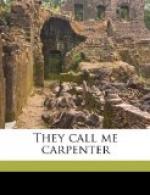But the hound was not interested in my generalities and evasions. “Where have you seen mobs of the rich, Mr. Carpenter?”
“I have seen them whirling through the streets in automobiles, killing the children of the poor.”
“You have seen that?”
“I saw it last night.”
Now, I had inspected our “Times” and our “Examiner” that morning, and noted that both, in their accounts of the accident, had given only the name of the chauffeur, and suppressed that of the owner. I understood what an amount of social and financial pressure that feat had taken; and here was Carpenter about to spoil it! I laid my hand on his arm, saying: “My friend, you were a guest in that car. You are not at liberty to talk about it.”
I expected to be argued with; but Carpenter apparently conceded my point, for he fell silent. It was the young reporter who spoke. “You were in an auto accident, I judge? We had only one report of a death, and that was caused by Mrs. Stebbins’ car. Were you in that?” Then, as neither Carpenter nor I replied, he laughed. “It doesn’t matter, because I couldn’t use the story. Mr. Stebbins is one of our ‘sacred cows.’ Good-day, and thank you.”
He started away; and suddenly all my terror of newspaper publicity overwhelmed me. I simply could not face the public as guardian of a Bolshevik! I shouted: “Young man!” And the reporter turned, respectfully, to listen. “I tell you, Mr. Carpenter is not a radical! Get that clear!” And to the young man’s skeptical half-smile I exclaimed: “He’s a Christian!” At which the reporter laughed out loud.
XXVII
We got to the Labor Temple, and found the place in a buzz of excitement, over what had occurred in front of Prince’s last night. I had suspected rough work on the part of the police, and here was the living evidence—men with bandages over cracked heads, men pulling open their shirts or pulling up their sleeves to show black and blue bruises. In the headquarters of the Restaurant Workers we found a crowd, jabbering in a dozen languages about their troubles; we learned that there were eight in jail, and several in the hospital, one not expected to live. All that had been going on, while we sat at table gluttonizing—and while tears were running down Carpenter’s cheeks!
It seemed to me that every third man in the crowd had one of the morning’s newspapers in his hand—the newspapers which told how a furious mob of armed ruffians had sought to break its way into Prince’s, and had with difficulty been driven off by the gallant protectors of the law. A man would read some passage which struck him as especially false; he would tell what he had seen or done, and he would crumple the paper in his hand and cry. “The liars! The dirty liars!”—adding adjectives not suitable for print.




